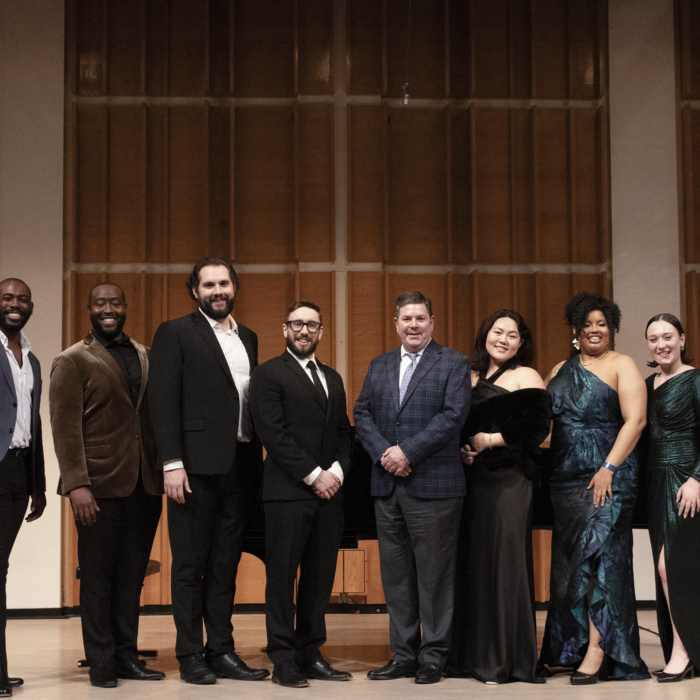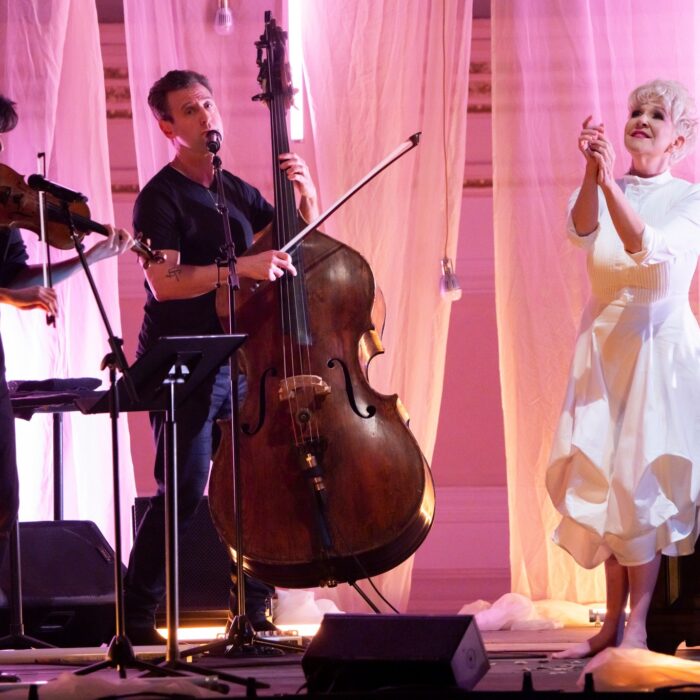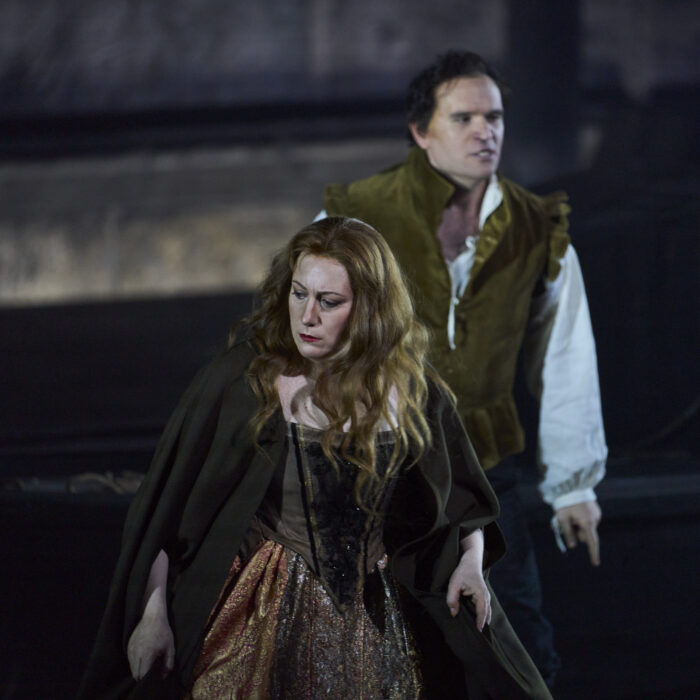
CD Review: Marco Angioloni ‘Il Canto Della Nutrice’
An Ambitious Recording Of Arias From One Of Opera’s Forgotten Characters
By Alan Neilson(Photo: Benoit Auguste)
Marco Angioloni is a young Italian tenor currently living in Paris. After graduating as an oboist from the Conservatorio Di Musica ‘Luigi Cherubini’ Firenze in Florence, Angioloni switched to singing and joined the Centre de Musique Baroque de Versailles in France. Since then he has performed on stages across Europe, tending to specialise in the baroque repertoire.
Clearly ambitious but tempered by a deep love of music, he has recently released a CD entitled “Il Canto della Nutrice” with the label Da Vinci Classics. An enterprising and well-researched disk, “Il Canto della Nutrice” explores the oft-overlooked figure of the “nurse,” a character who appears regularly in the operas of 17th Century Venice.
The Nurse
The character of the nurse was a product of Venice’s decision to open opera houses to the paying public. Profit became a prime motivator and composers and librettists alike created works that appealed to its now socially diverse audiences. Although they continued to use the same subjects and stories as before, often taken from Classical myths and ancient history, their treatment was now different; characters became more realistic, more varied and elements of comedy were introduced. A space was accordingly opened up into which stepped the character of the nurse.
She is customarily a plebeian character who is given charge of a child from a patrician or aristocratic family, and may remain in their service well after the child has reached adulthood, occupying a position of familiarity and influence. It is a role full of ambiguity and comedic potential, with no pretence on the part of the singer to hide the fact that she is being played by a man, allowing for a conspiratorial bond with the audience to develop.
It is, therefore, a role that allows a committed singer plenty of scope for a nuanced interpretation. Angioloni is certainly committed; in his notes, available in the CD’s accompanying booklet, he presents himself as a serious and thoughtful musician who has given considerable thought to this project and has undertaken a significant amount of research.
Il Canto della Nutrice
Searching through the operas composed for Venetian theatres from 1638 to 1670, when reforms rendered the figure obsolete, he uncovered 114 such roles. He has whittled these down to 13 tracks: ten arias by Francesco Cavalli (1602 – 1676), one by Antonio Sartorio (1630 – 1680), and an aria and duet by Domenico Scarlatti (1685 – 1757). Most of these have not, up to this point, ever been recorded. He is accompanied by the ensemble Il Groviglio, who also add four sinfonias to the disk, one each by Cavalli, Pietro Antonio Cesti (1623 – 69), Alessandro Melani (1639 – 1703), and Sartorio, which are interspersed between the arias, creating a nice sense of balance.
Angioloni took an ambitious and courageously interpretative approach, one aimed at bringing out the beauty and the emotional depth of each piece. He did not hold back; rather he pushed himself to his limits. There is no sense of him trying to sidestep any awkward passages or opting for an easier presentation. Moreover, the relatively thin musical accompaniment—consisting of six musicians—means that his voice is fully exposed to the extent that every small blemish and imperfection is clearly audible. The result, however, is not disappointing: each track has been given a clear definition, true to the text and presented with a considerable degree of musical sensitivity and emotional expressivity. It is also a recording that highlights the attractive character of Angioloni’s voice, which is light and bright with a transparent finish, giving his middle and upper registers an appealing quality.
What particularly stands out is Angioloni’s sensitivity to the text and his ability to clothe it with emotional nuance and depth, which is particularly notable in the delivery of recitatives. The exchange between Dorilla and Belisa—”Zi, zi sento fischiare”—from Scarlatti’s “L’Ottavia restituita al trono”, in which Dorilla is played by the soprano Francesca Martini, is lively and amusing. Angioloni plays the old nurse trying, without success, to attract the amorous attentions of a passing man played by a woman. It is a comedic scene, full of asides, insults, and verbal jousting. Angioloni’s use of dynamic shading, vocal accents, and inflections splendidly captures its comedy and underlying pathos, bringing the scene completely to life. Together the pair successfully create a fast-moving situation that glides smoothly into the duet “Arrogantaccio, va via.”
Track Five is a series of arias separated by recitatives taken from Cavalli’s opera “Orimonte.” The nurse Alcea, whose youth is becoming a distant memory, reflects on the joys of love in a bittersweet passage. Angioloni’s recitatives are so well delivered that they tie the sequence of arias together into a unified whole in which he successfully captures the nurse’s fleeting thoughts and heartfelt emotions.
The arias are of varying interest, but all are generally well-presented, in which Angioloni’s attention to detail and his determination to arrive at the emotional heart of the character, without compromising the beauty of the aria, stands out. There are, however, some notably strong tracks. Probably the best-known piece on the disk is Linfea’s aria “D’aver un consorte” from Cavalli’s “La Calisto.” Angioloni produces a purposeful rendition in which his acute sensitivity to the text is once again in evidence and into which he introduces short coloraturas and occasional brief ornamentations which beautifully reflect Linfea’s longing for love. Accompanied by Martini as both Satirino and Satiro, the piece moves gracefully along until the final section in which, in the middle of an orchestral passage, Linfea cries out for help. Angiolini makes her pain uncomfortably clear and brings the aria to a satisfying conclusion.
The aria “Maledetto sia del tempo” from Cavalli’s “Erismena” is another lament for lost youth and love. It is an accomplished rendition, with Angioloni displaying real skill in interpreting the ageing woman’s sadness in waving goodbye to love’s possibilities while advising young women to take up the opportunities before it is too late. His phrasing and diction, as on all the tracks, are excellent.
“Voglio provar anch’io che cosa è,” from Cavalli’s opera “Doriclea,” also attracts attention. It is an engaging track consisting of two arias separated by a recitative in which the nurse Melloe regrets missed opportunities and is now desperate to find love. Angioloni produces a detailed and vibrant reading in which he applies his vocal versatility to accent and subtly color the voice, mixing singing with parlando passages to create a sympathetic character.
Il Groviglio
The period-instrument ensemble Il Groviglio, founded by Angioloni, provides an excellent accompaniment. While never overshadowing the singer, their playing leaves a wholly positive impression. It is balanced, flexible and refined. Like Angioloni, they are responsive to the sensitivities of the text and they accordingly create a strong partnership with him in which music and voice blend together superbly. Four tracks devoted entirely to sinfonias allow them to further display their talents. Cavalli’s short sinfonia from “Muzio Scevola,” elevated by Il Groviglio’s lively and energetic playing, serves as the disk’s first track. The longest piece, lasting just under six minutes, is a sinfonia from “Il Girello” by Melani, broken down into four short movements of contrasting moods. The melancholic lilt of the third movement received a particularly attractive presentation.
The CD booklet is nicely designed and contains interesting notes by Angioloni and by Chiara Bertoglia. What is missing, however, is any reference to the works included on the disk: there is neither text nor context, nor anything else like that. It is possible to access the texts online, but only in Italian. The lack of context is annoying and detracts from the listening experience.
Overall, this is a pleasing disk with much to enjoy. Angioloni is a young artist still gaining experience, but on the strength of this recording, it is clear that he has considerable musical intelligence and talent, and his enthusiasm permeates not just his singing but also his research and preparation for this disk.



